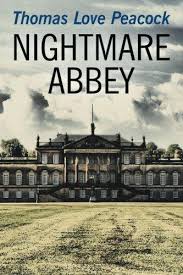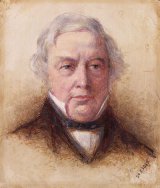Nightmare Abbey Page #12
Nightmare Abbey is an 1818 novella by Thomas Love Peacock, and his third long work of fiction to be published.
Marionetta made many ineffectual attempts to extract from Scythrop the secret of his mystery; and, in despair of drawing it from himself, began to form hopes that she might find a clue to it from Mr Flosky, who was Scythrop's dearest friend, and was more frequently than any other person admitted to his solitary tower. Mr Flosky, however, had ceased to be visible in a morning. He was engaged in the composition of a dismal ballad; and, Marionetta's uneasiness overcoming her scruples of decorum, she determined to seek him in the apartment which he had chosen for his study. She tapped at the door, and at the sound 'Come in,' entered the apartment. It was noon, and the sun was shining in full splendour, much to the annoyance of Mr Flosky, who had obviated the inconvenience by closing the shutters, and drawing the window-curtains. He was sitting at his table by the light of a solitary candle, with a pen in one hand, and a muffineer in the other, with which he occasionally sprinkled salt on the wick, to make it burn blue. He sat with 'his eye in a fine frenzy rolling,' and turned his inspired gaze on Marionetta as if she had been the ghastly ladie of a magical vision; then placed his hand before his eyes, with an appearance of manifest pain--shook his head--withdrew his hand--rubbed his eyes, like a waking man--and said, in a tone of ruefulness most jeremitaylorically pathetic, 'To what am I to attribute this very unexpected pleasure, my dear Miss O'Carroll?' MARIONETTA I must apologise for intruding on you, Mr Flosky; but the interest which I--you--take in my cousin Scythrop-- MR FLOSKY Pardon me, Miss O'Carroll; I do not take any interest in any person or thing on the face of the earth; which sentiment, if you analyse it, you will find to be the quintessence of the most refined philanthropy. MARIONETTA I will take it for granted that it is so, Mr Flosky; I am not conversant with metaphysical subtleties, but-- MR FLOSKY Subtleties! my dear Miss O'Carroll. I am sorry to find you participating in the vulgar error of the reading public, to whom an unusual collocation of words, involving a juxtaposition of antiperistatical ideas, immediately suggests the notion of hyperoxysophistical paradoxology. MARIONETTA Indeed, Mr Flosky, it suggests no such notion to me. I have sought you for the purpose of obtaining information. MR FLOSKY (shaking his head) No one ever sought me for such a purpose before. MARIONETTA I think, Mr Flosky--that is, I believe--that is, I fancy--that is, I imagine-- MR FLOSKY The [Greek: toytesti], the id est, the cioè, the c'est à dire, the that is, my dear Miss O'Carroll, is not applicable in this case--if you will permit me to take the liberty of saying so. Think is not synonymous with believe--for belief, in many most important particulars, results from the total absence, the absolute negation of thought, and is thereby the sane and orthodox condition of mind; and thought and belief are both essentially different from fancy, and fancy, again, is distinct from imagination. This distinction between fancy and imagination is one of the most abstruse and important points of metaphysics. I have written seven hundred pages of promise to elucidate it, which promise I shall keep as faithfully as the bank will its promise to pay. MARIONETTA I assure you, Mr Flosky, I care no more about metaphysics than I do about the bank; and, if you will condescend to talk to a simple girl in intelligible terms-- MR FLOSKY Say not condescend! Know you not that you talk to the most humble of men, to one who has buckled on the armour of sanctity, and clothed himself with humility as with a garment? MARIONETTA My cousin Scythrop has of late had an air of mystery about him, which gives me great uneasiness. MR FLOSKY That is strange: nothing is so becoming to a man as an air of mystery. Mystery is the very key-stone of all that is beautiful in poetry, all that is sacred in faith, and all that is recondite in transcendental psychology. I am writing a ballad which is all mystery; it is 'such stuff as dreams are made of,' and is, indeed, stuff made of a dream; for, last night I fell asleep as usual over my book, and had a vision of pure reason. I composed five hundred lines in my sleep; so that, having had a dream of a ballad, I am now officiating as my own Peter Quince, and making a ballad of my dream, and it shall be called Bottom's Dream, because it has no bottom. MARIONETTA I see, Mr Flosky, you think my intrusion unseasonable, and are inclined to punish it, by talking nonsense to me. (Mr Flosky gave a start at the word nonsense, which almost overturned the table.) I assure you, I would not have intruded if I had not been very much interested in the question I wish to ask you.--(Mr Flosky listened in sullen dignity.)--My cousin Scythrop seems to have some secret preying on his mind.--(Mr Flosky was silent.)--He seems very unhappy--Mr Flosky.--Perhaps you are acquainted with the cause.--(Mr Flosky was still silent.)--I only wish to know--Mr Flosky--if it is any thing--that could be remedied by any thing--that any one--of whom I know any thing--could do. MR FLOSKY (after a pause) There are various ways of getting at secrets. The most approved methods, as recommended both theoretically and practically in philosophical novels, are eavesdropping at key-holes, picking the locks of chests and desks, peeping into letters, steaming wafers, and insinuating hot wire under sealing wax; none of which methods I hold it lawful to practise. MARIONETTA Surely, Mr Flosky, you cannot suspect me of wishing to adopt or encourage such base and contemptible arts. MR FLOSKY Yet are they recommended, and with well-strung reasons, by writers of gravity and note, as simple and easy methods of studying character, and gratifying that laudable curiosity which aims at the knowledge of man. MARIONETTA I am as ignorant of this morality which you do not approve, as of the metaphysics which you do: I should be glad to know by your means, what is the matter with my cousin; I do not like to see him unhappy, and I suppose there is some reason for it. MR FLOSKY Now I should rather suppose there is no reason for it: it is the fashion to be unhappy. To have a reason for being so would be exceedingly common-place: to be so without any is the province of genius: the art of being miserable for misery's sake, has been brought to great perfection in our days; and the ancient Odyssey, which held forth a shining example of the endurance of real misfortune, will give place to a modern one, setting out a more instructive picture of querulous impatience under imaginary evils. MARIONETTA Will you oblige me, Mr Flosky, by giving me a plain answer to a plain question? MR FLOSKY It is impossible, my dear Miss O'Carroll. I never gave a plain answer to a question in my life. MARIONETTA
Translation
Translate and read this book in other languages:
Select another language:
- - Select -
- 简体中文 (Chinese - Simplified)
- 繁體中文 (Chinese - Traditional)
- Español (Spanish)
- Esperanto (Esperanto)
- 日本語 (Japanese)
- Português (Portuguese)
- Deutsch (German)
- العربية (Arabic)
- Français (French)
- Русский (Russian)
- ಕನ್ನಡ (Kannada)
- 한국어 (Korean)
- עברית (Hebrew)
- Gaeilge (Irish)
- Українська (Ukrainian)
- اردو (Urdu)
- Magyar (Hungarian)
- मानक हिन्दी (Hindi)
- Indonesia (Indonesian)
- Italiano (Italian)
- தமிழ் (Tamil)
- Türkçe (Turkish)
- తెలుగు (Telugu)
- ภาษาไทย (Thai)
- Tiếng Việt (Vietnamese)
- Čeština (Czech)
- Polski (Polish)
- Bahasa Indonesia (Indonesian)
- Românește (Romanian)
- Nederlands (Dutch)
- Ελληνικά (Greek)
- Latinum (Latin)
- Svenska (Swedish)
- Dansk (Danish)
- Suomi (Finnish)
- فارسی (Persian)
- ייִדיש (Yiddish)
- հայերեն (Armenian)
- Norsk (Norwegian)
- English (English)
Citation
Use the citation below to add this book to your bibliography:
Style:MLAChicagoAPA
"Nightmare Abbey Books." Literature.com. STANDS4 LLC, 2024. Web. 24 Nov. 2024. <https://www.literature.com/book/nightmare_abbey_48>.




Discuss this Nightmare Abbey book with the community:
Report Comment
We're doing our best to make sure our content is useful, accurate and safe.
If by any chance you spot an inappropriate comment while navigating through our website please use this form to let us know, and we'll take care of it shortly.
Attachment
You need to be logged in to favorite.
Log In